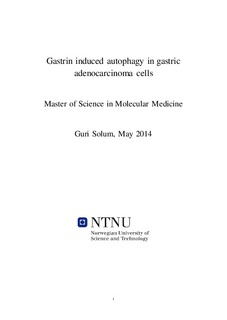Gastrin induced autophagy in gastric adenocarcinoma cells
Master thesis
Permanent lenke
http://hdl.handle.net/11250/280346Utgivelsesdato
2014Metadata
Vis full innførselSamlinger
Sammendrag
The Gastroenterology and Cell biology research group at NTNU studies the role of gastrin in gastric cancer. Gastrin is shown to be involved in proliferation, anti-apoptosis, migration, invasion and angiogenesis. The role of gastrin in gastric adenocarcinoma is debated, but hypergastrinemia is considered to be a risk factor for gastric cancer. Autophagy is a cellular degradation process, wherein damaged cytosolic components are engulfed, and the components are degraded and recycled. The role of autophagy in cancer is complex since autophagy both may promote and inhibit malignancy. In this study it was of interest to examine the role of gastrin in autophagy. Two gastric adenocarcinoma cell lines have been used during the study.
We show for the first time that gastrin treatment increases the expression of the autophagic markers LC3-II and p62 in AGS-Gr and MKN45 cells. Blocking of the CCK2 receptor inhibited the gastrin-mediated increase of LC3-II and p62. Gastrin treatment increased the expression of phosphorylated LKB1 (Ser428), AMPK (Thr172) and ULK1 (Ser317, 5), a pathway known to induce autophagy. Moreover, gastrin was shown to reduce the apoptotic effect mediated by cisplatin in AGS-Gr cells. This survival effect of gastrin was reduced when blocking autophagy. This indicates that gastrin-mediated autophagy likely induces protective properties in response to cisplatin, and autophagy may be a mechanism of the survival effects of gastrin.
